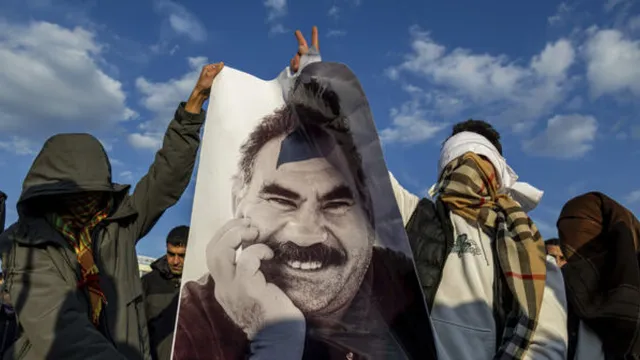
Kurdish fighters begin disarming in historic peace process
2025-07-03 13:24- The Kurdistan Workers' Party (PKK) has declared plans to begin disarming as part of a peace initiative with Turkey.
- Abdullah Ocalan, the imprisoned leader of the PKK, called for an end to armed conflict and the group's disbandment.
- The disarmament ceremony is slated for July 10-12 in Sulaymaniyah, marking a pivotal step toward achieving peace.
Express your sentiment!
Insights
In northern Iraq, a Kurdish militant group, the Kurdistan Workers' Party (PKK), has publicly declared its intention to start disarming as a tangible move toward achieving peace with Turkey. This announcement, made on a Thursday, marks a significant shift in the longstanding conflict that has persisted for over four decades, resulting in tens of thousands of casualties. The decision to disarm follows a call from Abdullah Ocalan, the imprisoned leader of the PKK, who urged members to renounce armed struggle and pursue a political solution. Ocalan, despite being incarcerated since 1999, remains a central figure in the Kurdish movement, influencing the direction of the PKK even from prison. The disarmament ceremony is slated to occur between July 10 and July 12 in Sulaymaniyah, located within Iraq's semi-autonomous Kurdish region. This occasion will see a group of guerrilla fighters officially surrender their arms, symbolizing their goodwill towards peace and democratic engagement. Reports indicate that around 40 PKK members are expected to relinquish their light weapons to the regional authorities during this event. The ceremony is a direct response to ongoing discussions regarding the peace efforts that have been central to resolving the long-standing tensions between the PKK and the Turkish government. The PKK has sustained significant military operations against the Turkish state, which has retaliated with airstrikes and ground offensives against PKK positions in northern Iraq. The nature of this armed conflict has resulted in numerous villages being abandoned and heightened military tensions in the region. Recently, Turkish officials have expressed optimism regarding the potential for disarmament, signaling a willingness to engage with Kurdish political representatives to further peace initiatives. However, obstacles remain, as Kurdish entities have urged the Turkish government to lift isolation measures on Ocalan, arguing that comprehensive constitutional reforms are necessary to facilitate the reintegration of former fighters into a peaceful political process. Evidently, the collaboration of various political factions within Iraq's Kurdish region complicates the progress of peace efforts. The Kurdistan Democratic Party (KDP) and the Patriotic Union of Kurdistan (PUK) maintain distinct relationships with the PKK, with the KDP traditionally aligned with Turkish interests while the PUK has leaned towards the PKK. As disarmament progresses, the dynamics of these relationships will be crucial in shaping the future political landscape of Kurdish autonomy and the broader peace discussions with Turkey.
Contexts
The history of the PKK (Kurdistan Workers' Party) and Turkey conflict is a complex and multifaceted narrative that has shaped the political landscape of Turkey and the broader Middle East for decades. The PKK, founded in 1978, emerged from the aspiration of the Kurdish population in Turkey for greater autonomy, cultural rights, and recognition amidst a backdrop of heavy state repression and denial of Kurdish identity. Originally led by Abdullah Öcalan, the PKK began armed insurgency against the Turkish state in 1984, marking the beginning of a conflict that would claim tens of thousands of lives and forcibly displace countless others. The Turkish government's response has included military operations, political interventions, and significant efforts to suppress Kurdish political movements and expression, further entrenching divisions and resentment on both sides. Throughout the late 20th century, the conflict oscillated between periods of intense violence and attempts at negotiation. The 1990s, in particular, were marked by brutal offensives by Turkish forces against PKK strongholds and widespread human rights violations against Kurdish civilians, including forced relocations and torture. In the early 2000s, a shift occurred when Öcalan was captured and imprisoned, creating a potential for dialogue. The Turkish government, under the reformist agenda of the Justice and Development Party (AKP), initiated peace talks in 2013, which generated a brief sense of optimism for a political resolution to the conflict. However, the peace process ultimately faltered around 2015, following a series of violent events including attacks attributed to the PKK and the Turkish government's increasing military operations in southeastern Anatolia. The rekindling of hostilities led to heightened tensions across the region, not just in Turkey but extending into northern Iraq and Syria, where the PKK and its affiliated organizations, including the YPG (People's Protection Units), have played significant roles in opposition to ISIS. The international community's response to the PKK as a terrorist organization has complicated dynamics, particularly as the PKK's actions are often intertwined with broader Kurdish aspirations and the geopolitical implications of the conflict. The ongoing conflict continues to severely impact civilians and enrichen the cycle of violence, creating a climate of mistrust that complicates efforts at reconciliation. The Turkish government's militarized approach and reluctance to address larger questions regarding Kurdish rights remain critical obstacles to peace. Amidst these struggles, the plight of the Kurdish people and their demand for recognition and autonomy remains pivotal, casting a long shadow over Turkey's domestic politics and relationships with neighboring countries. Sustainable resolution requires not only political will from Turkish leaders but also a broader understanding and commitment to addressing the root causes of the conflict, encompassing cultural rights, economic disparities, and inclusive governance that respects the diverse identity of Turkey's population.